Life Sciences News
See our Latest Journal Publications
Exploiting natural resistance to Turnip yellows virus in oilseed rape
 Dr Max Newbert and Professor John Walsh have prepared videos on the outcomes of their BBSRC Crop Improvement Research Club (CIRC) project on exploiting sources of plant virus resistance for deployment in oilseed rape. Dr Graham Teakle and Dr Guy Barker were project co-investigators and Dr Adam Baker was the PDRA. Sources of resistance were identified in oilseed rape and lines of the diploid progenitors of oilseed rape; QTLs associated with the three resistance sources have been mapped. All three resistances have been shown to be effective against viral isolates representing the different genetic groups of the virus. The diversity of the virus across Europe has been investigated with 179 whole genomes sequenced, detailed phylogenetic analyses performed, new weed hosts identified and a full-length infectious clone of the virus generated.
Dr Max Newbert and Professor John Walsh have prepared videos on the outcomes of their BBSRC Crop Improvement Research Club (CIRC) project on exploiting sources of plant virus resistance for deployment in oilseed rape. Dr Graham Teakle and Dr Guy Barker were project co-investigators and Dr Adam Baker was the PDRA. Sources of resistance were identified in oilseed rape and lines of the diploid progenitors of oilseed rape; QTLs associated with the three resistance sources have been mapped. All three resistances have been shown to be effective against viral isolates representing the different genetic groups of the virus. The diversity of the virus across Europe has been investigated with 179 whole genomes sequenced, detailed phylogenetic analyses performed, new weed hosts identified and a full-length infectious clone of the virus generated.
- Video for the general public:
Developing crops with natural resistance to plant diseases - Video for potential partners who would be interested in exploiting the resistances for deployment in commercial crops:
Identifying, mapping and exploiting natural resistance to Turnip yellows virus in oilseed rape and other brassicas
The videos were funded by BBSRC’s Impact Acceleration Account (IAA) grant to Warwick Ventures which also funded Max as an Impact Fellow supervised by Suzy Wood.
Exploring brain research at Warwick
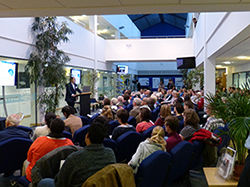 On the evening of Tuesday 11 October Professor Nick Dale organised a public science event devoted to the human brain.
On the evening of Tuesday 11 October Professor Nick Dale organised a public science event devoted to the human brain.
Members of the public were given the chance to find out about the cutting-edge neuroscience research taking place at the University of Warwick. Researchers gave demonstrations of science in action and tours of our laboratories. The event, ‘A healthy brain for a healthy life’, gave visitors the opportunity to find out how we can keep our brains in shape as we get older and how to put things right when the brain goes wrong.
There was also a demonstration of how our sense of self can be tricked into adopting inanimate objects, and a Q&A session where people found out about all those brain queries they wanted to know but were too afraid to ask!
If you missed this opportunity to visit the School of Life Sciences, other events will be running throughout the year including:
- Getting to Grips with antibiotic resistance
- Food Security – keeping plant pathogens at bay
- The Microbiome
- Films and Science
SLS Online Open Day
Our brand new Online Open Day has just gone live. It has been designed to help prospective students discover more about studying here. Current students and staff talk about courses, support for study and the student experience.
Have a look at http://4thwallmedia.co.uk/warwick-lifesciences/
Lameness treatment guidelines for sheep save UK farmers £700M
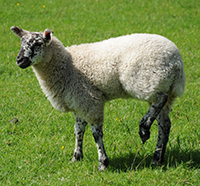 Evidence provided by researchers, led by Professor Laura Green from the School of Life Sciences, has helped cut the number of lame sheep in the UK national flock by half, saving the industry £700M over ten years and preventing 7.5 million sheep from becoming lame every year.
Evidence provided by researchers, led by Professor Laura Green from the School of Life Sciences, has helped cut the number of lame sheep in the UK national flock by half, saving the industry £700M over ten years and preventing 7.5 million sheep from becoming lame every year.
Read more about the BBSRC funded study
Your chance to explore science in the School of Life Sciences
Members of the public are to be given behind-the-scenes access to scientific laboratories at the University of Warwick, as well as the chance get to grips with cutting-edge research.
Over the next year, the School of Life Sciences will be running open events, allowing people of all ages to come along and find out how the natural world works – from the human brain, to antibiotics and climate change.
Researchers and staff will give live demonstrations of science in action and tours of working laboratories, and they’ll be on hand to answer your questions.
The first event, ‘A healthy brain for a healthy life’, will be devoted to exploring our amazing brains.
Dr Corinne Smith awarded Royal Society Leverhulme Trust Senior Research Fellowship
 Dr Corinne Smith has been awarded a Royal Society Leverhulme Trust Senior Research Fellowship for her project entitled "defining clathrin network interactions using advanced cryo-electron microscopy". The Fellowship will enable Dr Smith to spend a year away from teaching in order to focus on her research activities.
Dr Corinne Smith has been awarded a Royal Society Leverhulme Trust Senior Research Fellowship for her project entitled "defining clathrin network interactions using advanced cryo-electron microscopy". The Fellowship will enable Dr Smith to spend a year away from teaching in order to focus on her research activities.
Next step towards preventing cancer and Alzheimer's
 Dr Ioannis Nezis has led a research team to identify, and create a database of, the proteins needed for an essential cellular process, autophagy, which keeps our bodies healthy, but which declines as we age.
Dr Ioannis Nezis has led a research team to identify, and create a database of, the proteins needed for an essential cellular process, autophagy, which keeps our bodies healthy, but which declines as we age.
Better understanding of how these proteins work could lead to the development of drugs to stop this decline, and keep cells healthy for longer - thus preventing major age-related conditions, such as cancer, Crohn’s disease, neurodegenerative conditions, as well as viral and bacterial infections.
New IGGY Life Sciences Pages
The new IGGY Life Sciences pages go live today with a competition for IGGY members. Winners will receive free tickets to New Scientist Live.
For a short period the pages are open for non-members to view.
Need more information about IGGY?
Warwick Crop Centre Joins Historic Tractor Parade
 Staff and students from Warwick Crop Centre took part in the ‘70 tractors for 70 years’ Massey Ferguson procession organised by Coventry Transport Museum on Saturday 30 July.
Staff and students from Warwick Crop Centre took part in the ‘70 tractors for 70 years’ Massey Ferguson procession organised by Coventry Transport Museum on Saturday 30 July.
Life Sciences Graduation 2016
Congratulations to all our Life Sciences students who graduated today.
Unique Herbicide Binding Pattern discovered via Dow Agrosciences and University of Warwick collaboration
 Synthetic auxin herbicides have played an important role in weed management for decades with a highly effective yet complex mode of action. Dow AgroSciences collaborated with the University of Warwick to discover unique attributes of this important class of herbicides. The research highlighted receptor-binding uniqueness of Dow AgroSciences’ new arylpicolinate herbicides, including Arylex™ active and Rinskor™ active, compared to other commercial auxin herbicides.
Synthetic auxin herbicides have played an important role in weed management for decades with a highly effective yet complex mode of action. Dow AgroSciences collaborated with the University of Warwick to discover unique attributes of this important class of herbicides. The research highlighted receptor-binding uniqueness of Dow AgroSciences’ new arylpicolinate herbicides, including Arylex™ active and Rinskor™ active, compared to other commercial auxin herbicides.
Professor Richard Napier, from the School of Life Sciences, was the key cooperator who identified these unique differences. The way auxin herbicides bind to receptors in plant cells alters plant growth in susceptible species, leading to weed control.
Funding Success - UK-China AMR Partnership Initiative
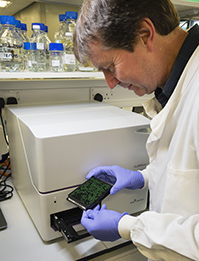 Accelerate CHNUK is a transnational drug discovery programme led in the UK by the University of Warwick (Professor Chris Dowson). The teams aim to deliver new antimicrobial leads using fragment based lead discovery (FBLD).
Accelerate CHNUK is a transnational drug discovery programme led in the UK by the University of Warwick (Professor Chris Dowson). The teams aim to deliver new antimicrobial leads using fragment based lead discovery (FBLD).
How viruses might influence estimates of global warming
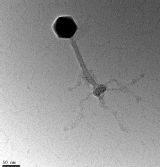 The tiniest life forms on Earth have a big impact on the way carbon dioxide is cycled between the atmosphere and the ocean, new research from the University of Warwick has found.
The tiniest life forms on Earth have a big impact on the way carbon dioxide is cycled between the atmosphere and the ocean, new research from the University of Warwick has found.
These life forms are viruses of some of the most abundant organisms on our planet: marine cyanobacteria.
The new research, Viruses Inhibit CO2 Fixation in the Most Abundant Phototrophs on Earth and published by Current Biology, demonstrates that the viruses of these cyanobacteria, cyanophages, use these genes to maintain the so-called “light-reactions” of photosynthesis, while shutting down the “dark-reactions”.
Cyanobacteria have had an incredible impact on the Earth by seeding the atmosphere with oxygen about 3 billion years ago, allowing for the existence of life as we know it. Today, this same process that acts to produce oxygen sucks up CO2 from the atmosphere.
Professor David Scanlan of the University of Warwick’s School of Life Sciences, the lead author of the research, said: “CO2 is a key greenhouse gas directly implicated in global warming. Given CO2 is converted into organic compounds during photosynthesis, factors that directly affect this process play a key role in modulating atmospheric CO2 levels.”
“We have known about these viruses for several decades” said Scanlan. “Things changed in 2003 when we discovered that these viruses have stolen genes from cyanobacteria that participate in photosynthesis. Now we have shown that these viruses modify photosynthesis during the demise of their host”.
On a global scale this results in losses of 0.02-5.39 Pg C yr-1 to viral induced inhibition of CO2 fixation. Per annum this upper figure is approximately 10% of the total CO2 fixed in the marine environment.
This data has important implications for measuring greenhouse gasses. Professor Scanlan explains:
“Quantification of net primary productivity is usually determined by directly measuring cyanobacterial photosynthesis and these methods rely on the coupling of light reactions to CO2 fixation”.
“In virus infected cells, this assumption of light reactions linked to CO2 fixation is incorrect and can therefore lead to a significant over estimation of CO2 fixation. This has very important implications for our understanding, and the estimates of, global warming.”
Contacts:
Professor Dave Scanlan
Email:
Tel: + 44 24 76 528363
Dr Andrew Millard
Email: Andrew.Millard@warwick.ac.uk
Tel: + 44 24 76 523589
The Elizabeth Creak Charitable Trust and the School of Life Sciences
The School of Life Sciences welcomes Professor Murray Grant, who recently took up the position of Elizabeth Creak Chair in Food Security and, thanks to a generous donation from the Elizabeth Creak Charitable Trust, researchers teach children about soil at the Kenilworth Show.
Plants remember stress to help protect themselves
A new generation of plants better adapted to mitigate the effects of environmental change could be created following a fundamental step towards understanding how plants are able to retain a memory of stress exposure.
The research, led by Dr Jose Gutierrez-Marcos and published in the journal eLife, provides the first compelling evidence that plants have evolved ways to remember previous exposures to stress, in this case high salinity conditions, which can help subsequent progenies withstand the same stress in future.
Guardian ranks University of Warwick in UK top 10
The UK's Guardian Newspaper has today, Monday 23 May 2016, once again ranked the University of Warwick in the UK’s top 10 universities, ranking it at 9th overall in the UK.
The full set of tables can be found at: http://www.theguardian.com/education/ng-interactive/2016/may/23/university-league-tables-2017#S100
Interested in studying biosciences with us? Come to one of our Open Days on 24 and 25 June to visit our campus and experience what it is like to be a student at Warwick.
University of Warwick honoured at Accreditation Awards Ceremony for Bioscience Degrees
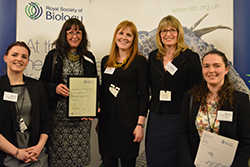 The University of Warwick has been formally awarded Advanced Accreditation for eight degree programmes by the Royal Society of Biology at the 2016 awards ceremony. The fourth annual awards, presented at the House of Commons on Thursday 14 April, recognised bioscience degree programmes which promote academic excellence, and prepare graduates for employment within the biosciences.
The University of Warwick has been formally awarded Advanced Accreditation for eight degree programmes by the Royal Society of Biology at the 2016 awards ceremony. The fourth annual awards, presented at the House of Commons on Thursday 14 April, recognised bioscience degree programmes which promote academic excellence, and prepare graduates for employment within the biosciences.Selection pressures push plants over adaption cliff – new study has significant implications for how we address rapid climate change
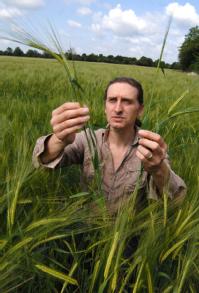 New simulations by researchers at the University of Warwick and UCL’s Institute of Archaeology of plant evolution over the last 3000 years have revealed an unexpected limit to how far useful crops can be pushed to adapt before they suffer population collapse. The result has significant implications for how growers, breeders and scientists help agriculture and horticulture respond to quickening climate change.
New simulations by researchers at the University of Warwick and UCL’s Institute of Archaeology of plant evolution over the last 3000 years have revealed an unexpected limit to how far useful crops can be pushed to adapt before they suffer population collapse. The result has significant implications for how growers, breeders and scientists help agriculture and horticulture respond to quickening climate change.
The research led by Professor Robin Allaby from the School of Life Sciences has just been published in the journal Evolutionary Genomics and is entitled "Evolutionary Genomics Surprisingly Low Limits of Selection in Plant Domestication".
Read the full Press Release
School of Life Sciences hosts British Biology Olympiad finals 4-6 April
Sixteen of the country’s best young biologists came to the University of Warwick this week for the British Biology Olympiad (BBO) finals; organised by the Royal Society of Biology and sponsored by BBSRC. The students had been selected through three rounds of examinations from more than 7,200 secondary school applicants.
The British Biology Olympiad final practical training programme in the School of Life Sciences was organised by Dr Leanne Williams and Dr Kevin Moffat, with Dr Miriam Gifford and Dr Logan Kistler. The students faced intensive high-level practicals covering a huge range of topics: animal anatomy, systemics and evolution, biochemistry and molecular biology, plant morphology, taxonomy and physiology. Their skills were assessed the following day with exams in the lab, and together with theory exams in the evening, an Olympiad team of 4 students was selected. Teaching was supported by the professional and enthusiastic Life Sciences lab technical team, who rapidly turned around the labs during the quick-fire four-course banquet of practicals and exams!
Details of the participating students and the winning team that will complete in the International Biology Olympiad in Vietnam this summer can be seen at British Biology Olympiad results
In July 2017 the University of Warwick in partnership with the Royal Society of Biology will host the International Biology Olympiad (IBO). This is a week-long biology competition for 16/17 year-olds which brings together winners of the National Biology Olympiads from over 60 countries. The School of Life Sciences will be involved in the practical and theory components of the competition utilising our excellent facilities and biological expertise.
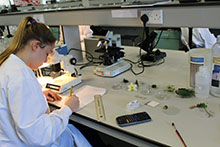 |
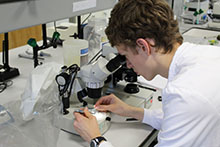 |
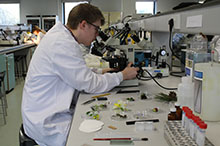 |
The many-headed-slime: It's alive!
 As part of British Science Week, members of Life Sciences took part in the Big Bang UK Young Scientists & Engineers Fair held at the NEC 16-19 March. Representing the Faculty of Science, staff and students from Life Sciences joined colleagues from Chemistry, Engineering and Physics to demonstrate science to children, parents and teachers.
As part of British Science Week, members of Life Sciences took part in the Big Bang UK Young Scientists & Engineers Fair held at the NEC 16-19 March. Representing the Faculty of Science, staff and students from Life Sciences joined colleagues from Chemistry, Engineering and Physics to demonstrate science to children, parents and teachers.
Visitors were able to meet Mazie and learn about the fascinating life of this slime mold.
For more details about this interesting slime visit the Knowledge Centre - The many-headed-slime;It's alive!
